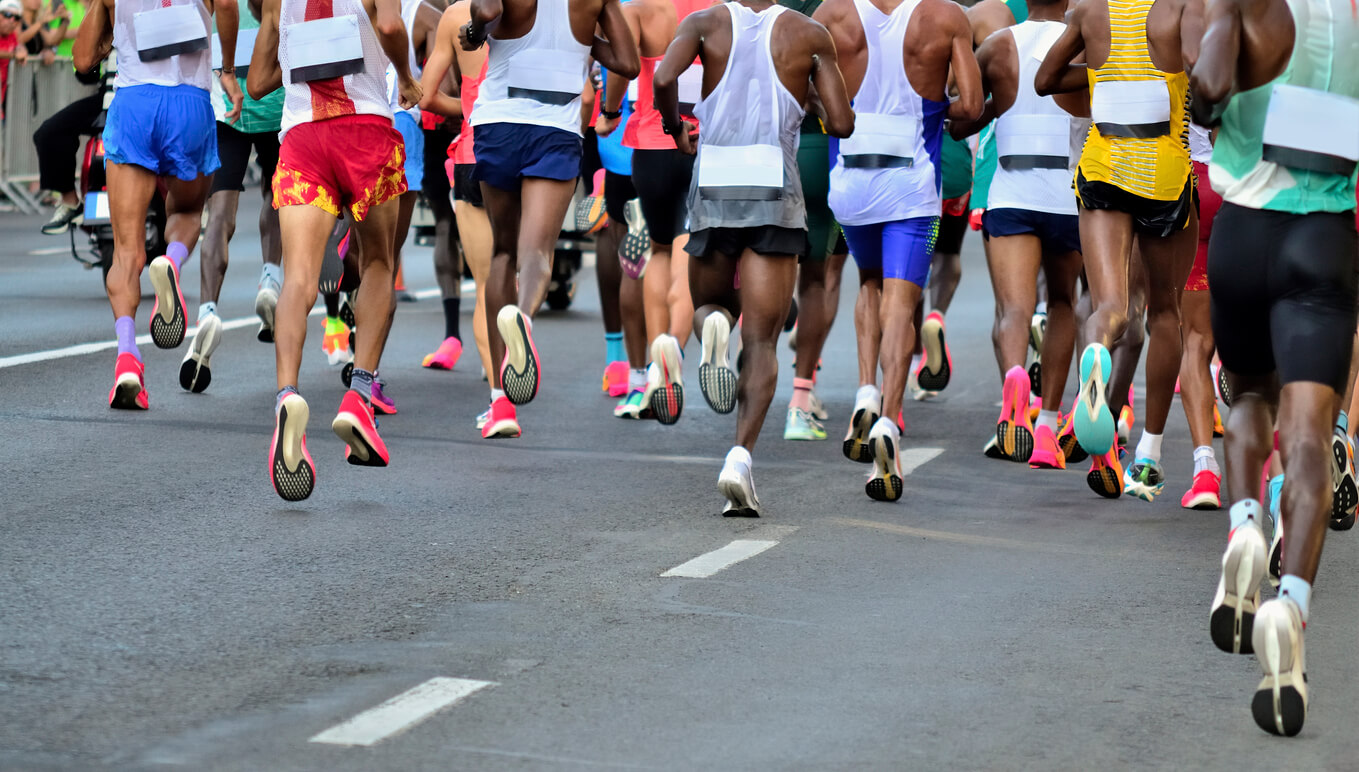The 8 best marathons in Europe
02 December 2025

When it comes to long-distance running, there’s simply no beating the marathon. For 26 miles, you can either push your body to the limit in pursuit of that elusive personal best, or soak in the scenery and camaraderie around you.
And as luck would have it, Europe is full to the brim with incredible marathons which can scratch your particular itch. Whether your distance running career is in its infancy or you’re a seasoned pro, there’s always a course which could be new to you.
With that in mind, here are eight of the best marathons in Europe, along with a couple of half-marathons well worth checking out, too.
1. Athens Classic Marathon
When: November
Where else to begin than the birthplace of the marathon itself?
The story goes that following Greece’s victory over the Persians in the Battle of Marathon in 490 BC, Greek messenger Pheidippides ran 26 miles from the battle to Athens to announce the triumph. From there, the marathon was born.
No surprise then that the route of the modern Athens Classic Marathon, held since 1972, is based on his journey. Runners begin in the town of Marathon and must battle a largely uphill route to reach the historic Panathenaic Stadium in Athens, the home of the modern Olympic Games.
There are few courses more steeped in history than this. Between 16,000 and 17,000 people typically participate in the full marathon, held every November, and thousands more compete in the half-marathon.
It’s hilly and hot, but you’ll struggle to find a more historically and culturally enriching marathon experience.
2. Paris Marathon
When: April
Another one of the best marathons in Europe, when it comes to taking on some pristine and historic sites, is unsurprisingly found in Paris.
For over 26 miles, beginning on the Avenue des Champs-Élysées and concluding on the Avenue Foch, you’ll be able to take in sights such as the Louvre, the Place de la Bastille, and of course, the Eiffel Tower.
Marathons have been run in Paris since 1896, but the current edition has been held since 1976. Unlike many marathons, you’ll need a doctor’s note to compete. But fear not, it’s not one of the most demanding marathons in Europe, besides some pesky cobbled streets.
Over 50,000 runners typically participate, making it one of the busiest events on the continent, but it’s a beautiful run nonetheless.
3. London Marathon
When: April
Since 1981, running enthusiasts have flocked to London every April (although it was held in October between 2020 and 2022) to take part in the London Marathon.
Based around the River Thames, you’ll see plenty of London’s iconic landmarks like Tower Bridge, Buckingham Palace and the Tower of London on the way to finishing at the Mall.
It’s a largely flat route, but it is remarkably busy. In 2025, over one million applications were received, but only around 56,000 people took part. With huge crowds watching as well, it’s a packed affair, and April in the UK means fair weather can’t be guaranteed.
Regardless of the weather, it’s a must-run for many runners. Few marathons in Europe can match its electric atmosphere.
Bonus: Great North Run (half marathon)
When: September
Staying in the UK, there aren’t many half marathons in the world more popular than the Great North Run. Its first rendition came in 1981, and its participation numbers have continued to grow since then.
Sixty thousand runners now take part every September, running between the centre of Newcastle and South Shields in the north east of England.
4. Berlin Marathon
When: September
Over in Germany’s historic capital city of Berlin, you’ll find one of the best marathons in Europe in which to attempt a personal best.
Like many of the other marathons on the continent, you’ll see historic sites aplenty, traversing between the old east and west halves of the city and encountering landmarks such as the Reichstag, Brandenburg Gate, and the Berliner Dom.
But why is it so good for achieving a personal best? Well, it’s one of the flattest and fastest marathons in Europe and indeed the world. Records have been set at the Berlin Marathon fairly regularly since its establishment in 1974. In 2022, Eliud Kipchoge broke the marathon world record on this very course, finishing his race in 2:01:09.
Like many of the other marathons held in major European capitals, it’s a busy one. Held at the end of September, its most recent edition saw over 54,000 runners cross the line.
If you’re not deterred by the prospect of entering a ballot to compete (like London), it’s definitely one to consider if you’re after a broken record or two.
5. Rome Marathon
When: March
Some more history for you now, and it doesn’t get much better than Rome.
The Roman Forum, the Vatican City, the Colosseum, and St. Peter’s Basilica. They can all be found on the route of this tremendous marathon.
Held every March since 1982 (besides the COVID years), the weather conditions are ideal, and the route is a reasonably flat one, although the appearance of cobbled roads in the final 10K might not be a sight for sore eyes (or, indeed, sore legs).
More than 28,000 runners took part in 2025, making it a moderately busy event, but one that pales in comparison to the likes of London and Paris.
You’re unlikely to set a personal best, but when in Rome, it might be best to focus on the scenery anyway.
6. Tromsø Midnight Sun Marathon
When: June
This one is truly one of the most unique marathons in Europe.
Held since 1990 by the Midnight Sun Marathon Foundation, Tromsø’s marathon is spectacular due to its location (350km north of the Arctic Circle) and its timing (late June). The result is the rare phenomenon from which the event derives its name. You’ll run with a blazing sun at midnight.
In Tromsø’s summertime, daylight persists for 24 hours per day. This marathon begins at around 20:30, allowing runners to experience full sunlight at midnight.
It’s not easy to get so far into Norway, so in 2025, only 9,000 runners competed across the five distances on offer (including a half-marathon). If you make the trek, though, you’ll experience a race truly unlike any other.
Bonus: Göteborgsvarvet Half Marathon
When: May
Elsewhere in Scandinavia, the Göteborgsvarvet Half Marathon is one of the most popular events of its type in Europe – even more so than the Great North Run. Over 60,000 runners participate every year, making it the world's busiest race.
You’ll cross two bridges in the Swedish city of Gothenburg, offering some tremendous – but crowded – views. It’s held annually in May, with its first edition back in 1980.
7. Amsterdam Marathon
When: October
Amsterdam has one of the best marathons in Europe for pursuing a personal best. After all, the Netherlands is, of course, known for being very flat.
The Amsterdam Marathon has been held since 1975, although marathons have been run in the city since 1928 (when the Olympics were held in Amsterdam).
While the city itself is steeped in historical landmarks, part of the beauty of its marathon is that it’s a very natural run. Scenic parks and canals will host you for much of the journey, although there’s no guarantee the weather will be on your side with the event taking place in October.
In 2024, 22,500 runners participated in the race, so it’s not overly crowded, particularly once the early crowds have dispersed.
8. Barcelona Marathon
When: March
Finally, Barcelona offers one of the best marathons in Europe in terms of scenery. Many of the city’s most famous landmarks, such as the Plaça d’Espanya (where the race begins and ends), Camp Nou, and the Sagrada Família, are all visible on the route.
The event has been held since 1978, and is unsurprisingly one of the most popular marathons anywhere in Spain and Europe.
In March 2025, 27,000 runners participated, surpassing the previous record from 2016 by nearly 7,000. For a beautiful run in ideal conditions, it’s easy to see why its popularity has skyrocketed.
How to prepare for a marathon

If you’re planning on participating in any of the above marathons, it’s essential to know how to prepare.
First things first, you need to set achievable goals for yourself. If you’ve never run a marathon before, it might be a success to reach the finish line without stopping to walk. If you’ve ticked off a few, now you can start thinking about personal bests. Your experience and personal preferences determine how hard you train.
Marathons don’t just happen. You need to stay dedicated and consistent for weeks – even months. Sixteen weeks is advisable for runners who have taken on a marathon before, but you may require more training if it’s your first time. Using a running app like Strava or Nike Run Club can help you stay on track.
Make sure you’re practising with different distances, too. One long run per week, gradually increasing in distance as you practice, should be combined with shorter, gentler runs. Going far and hard every time you go on a run is a recipe for injury. Make sure you rest.
Then there’s nutrition and hydration. When you’re preparing for a big race, keeping fit isn’t just limited to your running. Eat healthily, stay hydrated and cut down on any bad habits while you’re training. Your body will thank you for it!
Ultimately, have fun. Marathons are hard. They take a lot of effort, and most people will never run one. But if you’re ready to take it on, enjoy each step, and you’ll find marathon running remarkably rewarding.
Specialist running insurance through Insure4Sport
Running a marathon is no mean feat, wherever you decide to do it. It’s the ultimate test of physical and mental resilience. But before you get going, you might want to consider protecting yourself financially through specialist running insurance, in case anything should go wrong.
Through Insure4Sport, you can also get Worldwide Cover, covering you anywhere in the world for up to 180 days each year. Get a quote online today to find out more.
Please note the information provided on this page should not be taken as advice and has been written as a matter of opinion. For more on insurance cover and policy wording, see our homepage.
Get a quick quote for Sports Insurance
Get A QuoteRelated Posts
Got a question? Call our UK call centre 0800 158 5530
©Copyright Ripe Thinking Limited 2026.
Insure4Sport® is a registered trademark and a trading name of Ripe Insurance Services Limited which is Authorised and Regulated by the Financial Conduct Authority No.313411. Registered office: One Stockport Exchange, Railway Road, Stockport, United Kingdom, SK1 3SW. Registered in England No. 04507332.
